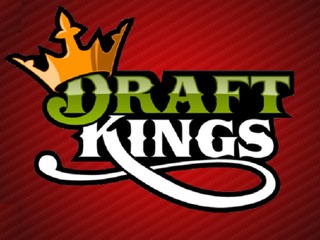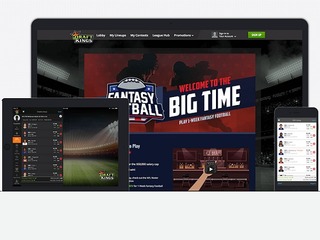Oxford Cancer Analytics raises $11M to detect lung cancer via a blood test
OXcan combines proteomics and artificial intelligence for early detection
Read more...
After months of rumors and speculation that FanDuel and Draftkings were getting ready to combine forces, the two companies have finally made it official.
The daily fantasy sports giants will be merging into a single company, it was announced on Friday. No financial terms of the deal were disclosed.
When the deal closes, DraftKings CEO Jason Robins will become CEO of the newly combined company, while FanDuel CEO Nigel Eccles will become Chairman of the Board. The rest of the Board will be composed of three directors from DraftKings, three directors from FanDuel and one independent director, none of whom have been named at this time.
The combined company will be co-headquartered in New York and Boston.
In a Q&A, Draftkings and FanDuel revealed that they will remain separate, standalone companies through the 2017 NFL season, while the deal is being finalized. Once the transaction, which is expected to close in 2017, is done, it's not clear which brand it will be operating under.
“We have always been passionate about providing the best possible experience for our customers and this merger will help advance our goal of building a transformational global sports entertainment platform,” Robins said in a statement.
“Joining forces will allow us to truly realize the potential of our vision, and as a combined company we will be able to accelerate the pace of innovation and bring a richer experience to our customers than we ever could have done separately.”
Why merge?
There are two main reasons for the companies to become one. First, they can stop spending so much to compete against each other. The two companies, which compete directly against each other for the exact same players, have reportedly spend hundreds of millions each on ad campaigns, which resulted in oversaturation and way too many TV ads.
More importantly, it would allow them to combine resources to weather the unfriendly environment the space has been dealing with since New York Attorney General Eric Schneiderman launched an investigation into whether the companies committed fraud last year, a DraftKings employee inadvertently admitted that he had bet on FanDuel using insider information on NFL lineups before they had been publicly posted. He won $350,000 on the site.
Both companies responded by banning their employees from playing in daily fantasy leagues, along with creating advisory boards to help them sort through legal matters, but Schneiderman continued his persuit and, in December, a judge in New York banned both companies.
They scored a major victory in the state over the summer when the Governor voted to legalize, and regulate, the industry, but they still have a fight on their hands in numerous other states that have also sought to regulate, or outright ban, paid daily fantasy sports. Betting on fantasy sports was banned in Idaho earlier this year, though the companies are still allowed to offer free leagues in the state.
The scandals have taken their toll, not only on the space in general, but on the individual companies as well. Both of them were once unicorns, valued at over $1 billion, but have reportedly seen their valuations cut in half.
Draftkings has raised just under $600 million, including a $150 million round in September. While the company wouldn't comment on its valuation, it was reported that it was being valued "substantially lower" than the $2 billion the company got when it raised a $300 million round in July of last year.
FanDuel has raised over $416 million, including $55 million in September from existing investors. It did not reveal its valuation at the time.
Not surprisingly, the uncertain regualtory environment was mentioned in the press release announcing the merger.
"Both FanDuel and DraftKings are still relatively new companies and operate in a rapidly evolving and changing space. By combining and streamlining resources, DraftKings and FanDuel can accelerate work with government officials to continue to develop a standard regulatory framework," it says.
"This framework will not only make it easier for the combined entity to thrive in the long-term, but will provide certainty and encourage other companies to make significant investments in the fantasy sports industry."
Before the two companies can merge, they will have to deal with regulatory agencies to get their approval. That could include the Federal Trade Commission an attorney for FanDuel told the Wall Street Journal, who also said he doesn't believe that will be a problem.
Editors note: At our Vator Splash Spring event earlier this year, Tom Griffiths, CPO and Co-founder of daily fantasy sports company FanDuel, sat down with Paul Martino, Partner at Bullpen Capital, to talk about the future of fantasy sports.
Our Post Seed VC event is coming up on Dec. 1 in San Francisco in partnership with Bullpen. We'll have Chamath Palihapitiya (Founder of Social Capital), Aydin Senkut (Felicis), Jeff Lawson (Founder & CEO, Twilio) and more. Check out the full lineup and register for tickets before they jump! Post Seed is brought to you by Vator, Bullpen Capital, and Haystack.
(Image source: adweek.com)
OXcan combines proteomics and artificial intelligence for early detection
Read more...Nearly $265B in claims are denied every year because of the way they're coded
Read more...Most expect to see revenue rise, while also embracing technologies like generative AI
Read more...Startup/Business
Joined Vator on
Hubdub Ltd is a VC funded start-up based in Edinburgh and San Francisco that aims to be the world’s largest developer of premium social games for sports fans. Its main product, FanDuel, transforms traditional fantasy sports ($1bn, 30m people market) into an instant gratification daily game where users win cash prizes every day. It is played on FanDuel.com, via white label partners such as Philly.com, and in future on Facebook and mobile.











